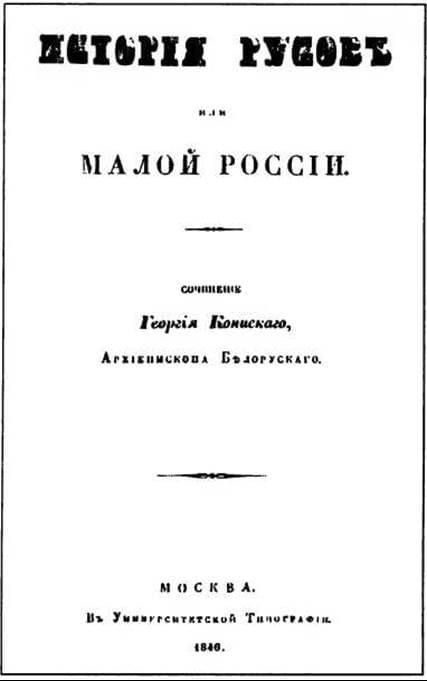"The History of the Rus"

[Shuixiang Xiansi] I mentioned last time that the last line of the Ukrainian national anthem sings "We belong to the Cossacks", which shows that Ukraine has a deep connection with the Cossacks. The Putin government has repeatedly emphasized that the Ukrainians are the little Russians on the border, and they have the same roots as the big Russians around Moscow. The Ukrainians obviously prefer to posthumously recognize the Cossacks as their ancestors. What is the reason for this difference?
Beginning in 1825, a manuscript of an anonymous author's book entitled "The History of the Rus or the Little Rus" (Исторія Русовъ, или Малой Россіи, Istoriia Rusov, ili Maloy Rossii) began to circulate in the Ukrainian underground. The Cossacks said. The title of the book alone is already remarkable. Although Syria regards the protagonist as a Ukrainian, the term "Ukrainian" was not used at the time. The title of the book mentions the people of Rus, and even calls Ukraine "Little Rus", which is enough to speculate that the current name of Ukraine has not been finalized at the time. What is especially interesting is that the Rus people and the little Rus are juxtaposed on the title of the book. It can be seen that the author believes that what happened on the black soil of Ukraine represents the history of the Rus people. So where did he put the Great Ross on the Moscow side?
Although it is called "History of the Rus", the text is mostly praised for the great achievements of the Cossacks. The truth is that compared with the big Rus on the Moscow side, the author argues that the Cossacks who rule Kyiv are the most qualified to inherit the name of the Rus. The reason is that Kyiv is the birthplace of the Rus, and the heroes of the Cossack have repeatedly led the local Rus to resist. Invasion of strong neighbors. It can be seen from this that the Ukrainians are chasing after the Cossacks, and there is no fundamental conflict with their Russ blood. The deeds of the Cossacks provided the Ukrainians with an alternative national imagination, different from the Russian version of Russian orthodoxy.
The "History of the Rus" was circulated at the time when the Ukrainian national revival movement was in its infancy. Since the Czarist Empire regained the Cossack Emirate, it has gradually stifled the language and customs of the remnants of the previous dynasty, trying to put out all the flames of resistance. Unexpectedly, the oppression brought a longer resistance, and the people who left the country did not forget their homeland. People of insight took the lead in advocating national independence, and took the Cossacks who resisted their strong neighbors as a model, planting the seeds of future Putin government accusations of fascism.
This "Russian History", whose author is unknown, has the effect of condensing people's hearts. It is an important document for shaping the Ukrainian nation, especially inspiring scholars in the nineteenth century, and the later Ukrainian national anthem was also born at this time. The national anthem "Ukraine Is Not Dead" has words first and then music. The lyrics were written by the patriotic poet Pavlo Chubynsky in 1863 and are said to be inspired by the sad Polish national anthem Mazurek Dąbrowskiego (Poland Is Not Dead). The same year that the lyrics were published, the authorities exiled Jubinski on the grounds of bewitching people. The following year, the lyrics were officially published, and it became popular immediately, followed by the music of Father Verbytsky (Михайло Вербицький, Mykhailo Verbytsky), which laid the prototype of the national anthem in the future.
Like my work? Don't forget to support and clap, let me know that you are with me on the road of creation. Keep this enthusiasm together!
